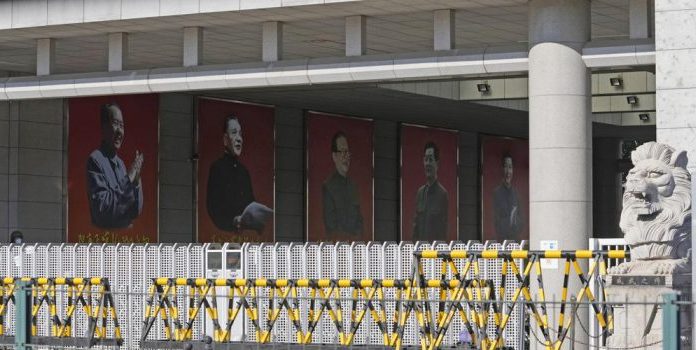As Chinese dictator Xi Jinping seeks the first-ever third term as the President of the People’s Republic of China and General Secretary of the Chinese Communist Party, he has rewritten the nation’s history to put himself at center stage, The Wall Street Journal reported.
The Chinese Communist Party on Nov. 16 released a historical document that aims to “unify the thoughts and actions” of its 95 million members.
The document, which party elites crafted in private, portrays Xi as the leader most fit to keep China on its “continuous trajectory of revolutionary change” and to unseat the West, and in particular the United States, from global hegemony.
The CCP has updated the nation and party’s official history on only two prior occasions: in 1945 under Mao Zedong, who founded the People’s Republic of China, and in 1981 under Deng Xiaoping, who liberalized the Chinese economy.
Both Mao and Deng rewrote the party’s history to resolve ideological battles, rebuke opposition leaders, and give themselves more solid authority.
Deng, for example, criticized Mao’s decade-long Cultural Revolution
The CCP’s new historical document does not relitigate the past but focuses instead on Xi’s revolutionary efforts to propel China to global supremacy. Xi resides at the party’s “core.”
Jiang Jinquan, who leads the CCP’s highest policy research office, explained at a news conference that Xi’s leadership has guaranteed that “the giant ship of Chinese renaissance will have a helmsman, and we will be able to sit calmly in our vessel in the face of stormy seas.”
Joseph Torigian, a historian at American University, discussed the document’s two-fold purpose.
“This is a document that is trying to achieve two things at once,” he said. Xi “wants continuity with the past, but he also wants to talk about why he is special.”
Rather than denouncing Mao, as Deng did, the CCP’s new party history praises the nation’s founder and references him 18 times. Xi’s CCP restrained itself to a limited criticism of Mao’s “theoretical and practical mistakes” in the Cultural Revolution, rather than condemning the entire project.
The document mentions later leaders, like Deng, eight times and Xi’s predecessors, Jiang Zemin and Hu Jintao, only one time each.
The CCP document revives the memory of Mao’s dictatorship as a glorious period in China’s history and places less emphasis on Deng’s economic liberalization.
The document states that Mao “charted the correct course for securing victory in the new-democratic revolution.”
All these changes aim at a practical purpose: Deng’s criticism of Mao’s dictatorship led the CCP to adopt presidential term limits—two five-year terms.
Xi’s embrace of Mao’s dictatorship led the party to abandon presidential terms limits in 2018, so that Xi can seek a third term in 2023.
The document forces the CCP to “uphold two narratives simultaneously, which remain in constant tension,” according to Daniel Leese, a professor of Chinese history at the University of Freiburg.
On the one hand, the document “affirms the general correctness of party policies since 1978” and “the tremendous transformation from standing up and growing prosperous to becoming strong.”
On the other hand, it asserts that Xi inherited a “pretty bleak” outlook that will require him to finish “what other people did not.”
All these changes mark danger for the United States and the Western world.
Whereas Deng’s party thought that China needed “to learn everything from all foreign countries that are beneficial to us,” Xi’s party demands that the nation “remain on guard against the erosive influence of Western trends of political thought.”

